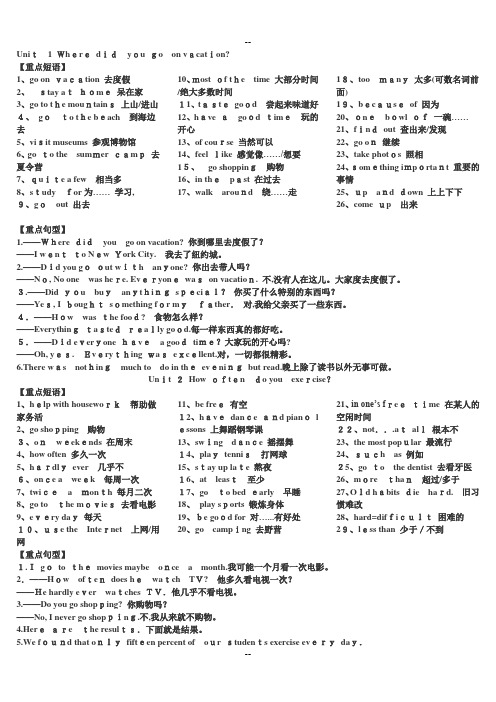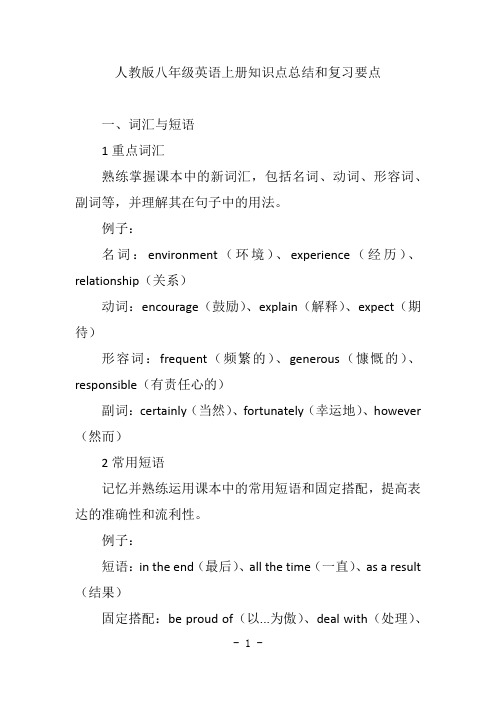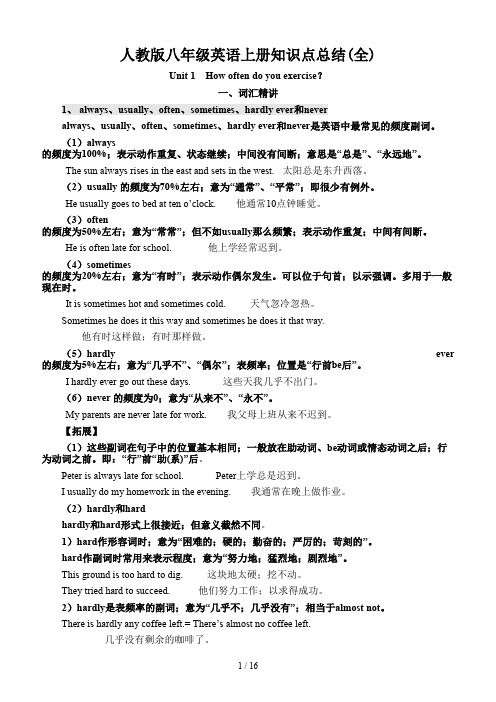人教版八年级上册英语知识点
人教版英语八年级上册知识点、语法和作文总结

八年级上册英语知识点Unit1 Where did you go on vacation?一、短语stay at home 待在家里 go on vacation 去度假 go to the mountains 去爬山 go to the beach 去海滩 visit museums 参观博物馆 quite a few 相当多 go to summer camp 去参观夏令营study for 为……而学习 go out 出去 most of the time 大部分时间taste good 尝起来很好吃 of course 当然 have a good time 玩得高兴go shopping 去购物 feel like 给…的感觉;感受到 in the past 在过去walk aroundone bowl of… a bag of apples drink tea 喝茶 take photos 二、习惯用法 taste + adj. nothing…but+arrive in+大地点 / arrive at+小地点到达某地decide to do sth. 决定去做某事 try doing sth.尝试做某事 try to do sth.尽力去做某事forget doing sth.忘记做过某事/ forget to do sth.忘记做某事 enjoy doing sth.喜欢做某事want to do sth.想去做某事 start doing sth.开始做某事 stop doing sth. 停止做某事dislike doing sth. 不喜欢做某事 keep doing sth.继续做某事 Why not do sth.? 为什么不做……呢?so+adj.+that+从句如此……以至于…… tell sb. (not) to do sth. 告诉某人(不要)做某事三、词语辨析:1. anywhere 与 somewhere 两者都是不定副词。
复习人教版八年级英语上册各单元必背知识点整理(打印版)

Unit 1 Wheredidyou go on vacation? 【重点短语】1、go on vacation 去度假2、stay athome呆在家3、go to the mountains上山/进山4、goto the beach到海边去5、visit museums 参观博物馆6、go to the summer camp去夏令营7、quite a few相当多8、studyfor为…… 学习,9、goout 出去10、most of the time 大部分时间/绝大多数时间11、tastegood尝起来味道好12、have agood time玩的开心13、of course 当然可以14、feel like 感觉像……/想要15、go shopping购物16、in thepast 在过去17、walk around绕……走18、toomany太多(可数名词前面)19、becauseof 因为20、onebowl of一碗……21、findout 查出来/发现22、go on继续23、take photos 照相24、something important 重要的事情25、up and down 上上下下26、come up出来【重点句型】1.——Where didyou go on vacation? 你到哪里去度假了?——I wentto New York City.我去了纽约城。
2.——Did you goout with anyone? 你出去带人吗?——No, No one was here. Everyonewason vacation. 不,没有人在这儿。
大家度去度假了。
3.——Did you buyanythingspecial?你买了什么特别的东西吗?——Yes, I boughtsomething for myfather.对,我给父亲买了一些东西。
4.——How was the food?食物怎么样?——Everythingtastedreally good.每一样东西真的都好吃。
人教版八年级上册英语语法、短语和知识点总结归纳

人教版八年级上册英语语法、短语和知识点总结归纳一、语法1. 一般现在时- 用法:表示经常性或惯性的动作或状态。
- 结构:主语 + 动词原形 (+ 其他成分)- 示例:I play soccer every weekend.2. 一般过去时- 用法:表示过去某个时间点或一段时间内发生的动作或存在的状态。
- 结构:主语 + 动词过去式 (+ 其他成分)- 示例:She watched a movie last night.3. 现在进行时- 用法:表示现在正在发生的动作。
- 结构:主语 + am/is/are + 动词-ing (+ 其他成分)- 示例:They are studying for the exam.4. 现在完成时- 用法:表示动作或状态发生在过去某个时间点,但与现在有关。
- 结构:主语 + have/has + 动词过去分词 (+ 其他成分)- 示例:I have finished my homework.5. 情态动词- 用法:表示能力、意愿、可能性等。
- 常见的情态动词有 can, could, may, might, must, should, ought to 等。
- 示例:He should go to bed early.二、短语1. as well as- 用法:表示两个事物同时存在或发生。
- 示例:She can speak English as well as Chinese.2. in order to- 用法:为了做某事。
- 示例:They woke up early in order to catch the train.3. by the way- 用法:用于引入一个新的话题或问题。
- 示例:By the way, have you seen the latest movie?三、知识点1. 直接引语和间接引语- 直接引语:用引号括起来的原话。
- 间接引语:将直接引语转述为陈述句或疑问句。
人教版八年级英语上册知识点总结

人教版八年级英语上册知识点总结一、基本语法1.时态:英语时态分为以下几种:现在时、过去时、将来时。
每种时态又分为简单时态、进行时态、完成时态和完成进行时态等。
例如:–现在时:简单现在时: 主语 + 动词原形;进行现在时:主语 + be(am/is/are) + v-ing;完成现在时:主语 + have / has + 过去分词;完成进行现在时:主语 + have / has + been + v-ing。
–过去时:简单过去时:主语 + 动词过去式;进行过去时:主语 + was / were + v-ing;完成过去时:主语 + had + 过去分词;完成进行过去时:主语 + had + been + v-ing。
–将来时:简单将来时:主语 + will / shall + 动词原形;进行将来时:主语 + will / shall + be + v-ing;完成将来时:主语 + will / shall + have + 过去分词;完成进行将来时:主语 + will / shall + have + been + v-ing。
2.倒装句:倒装是指把谓语动词放在主语前面形成的一种语法现象。
如:Only in this way can we solve the problem. (只有这样才能解决问题。
) 倒装句句型格式为:_____+主语(名词或代词)+_____。
在不同的情况下需要用到不同的“辅助动词/助动词”来进行倒装。
3.被动语态:被动语态就是在句子中表达动作的承受者(即主语)的语态。
结构为:被(或受)动责任的动词(to be) + 过去分词。
如:The book was written by him.(这本书是由他写的。
)4.虚拟语气:虚拟语气是指在表示假设,愿望,建议等语气时所使用的一种语态形式。
其结构为:主语+should/could/might/would+(have)+动词原形。
如: If I were you, I would buy this dress(如果我是你,我会买这件衣服。
人教版八年级英语上册知识点总结和复习要点

人教版八年级英语上册知识点总结和复习要点一、词汇与短语1重点词汇熟练掌握课本中的新词汇,包括名词、动词、形容词、副词等,并理解其在句子中的用法。
例子:名词:environment(环境)、experience(经历)、relationship(关系)动词:encourage(鼓励)、explain(解释)、expect(期待)形容词:frequent(频繁的)、generous(慷慨的)、responsible(有责任心的)副词:certainly(当然)、fortunately(幸运地)、however (然而)2常用短语记忆并熟练运用课本中的常用短语和固定搭配,提高表达的准确性和流利性。
例子:短语:in the end(最后)、all the time(一直)、as a result (结果)固定搭配:be proud of(以...为傲)、deal with(处理)、pay attention to(注意)二、句型与语法1基本句型熟练掌握五种基本句型,包括主语+谓语、主语+谓语+宾语、主语+谓语+间接宾语+直接宾语、主语+谓语+宾语+宾语补足语、主语+系动词+表语。
例子:主语+谓语:She sings.(她唱歌。
)主语+谓语+宾语:I like apples.(我喜欢苹果。
)主语+谓语+间接宾语+直接宾语:He gave me a book.(他给了我一本书。
)主语+谓语+宾语+宾语补足语:I found the book interesting.(我发现这本书很有趣。
)主语+系动词+表语:She is beautiful.(她很漂亮。
)2时态深入学习并掌握现在完成时、过去进行时、一般将来时、过去将来时等时态的用法和形式。
例子:现在完成时:I have already seen that movie.(我已经看过那部电影了。
)过去进行时:They were playing football when I called them.(我打电话给他们时,他们正在踢足球。
人教版英语:八年级上册各单元必考知识点汇总

人教版英语:八年级上册各单元必考知识点汇总Unit1 Where did you go on vacation?【重点语法】不定代词:不指名代替任何特定名词或形容词的代词叫做不定代词。
用法注意:1. some和any +可数名/不可数名。
some多用于肯定句,any多用于否定句、疑问句和条件从句。
有些问句中用some,不用any,问话者希望得到对方肯定回答。
2.由some, any, no, every与body, one, thing构成的复合不定代词作主语时,其谓语动词用三单。
3.不定代词若有定语修饰,该定语要置于其后:如:somethinginteresting【重点短语】1. buy XXX为某人买某物2. taste + adj.尝起来……3. nothing...but + V.(真相)除……以外甚么都没有4. seem + (to be) + adj看起来5. XXX抵达某地6. XXX do XXX决定做某事7. try doing sth.测验考试做某事/ try to do sth.极力做某事8. XXX喜欢做某事9. want to do sth.想去做某事10. XXX.入手下手做某事=XXX.11. stop XXX截止做某事辨别:stop to do sth.停下往来来往做某事12.XXX XXX.不喜欢做某事14.so + adj + that +从句如此……以至于……16. tell sb. (not) to do sth.告诉某人(不要)做某事17. keep XXX继续做某事18. forget to do XXX.忘记去做某事XXX忘记做过某事【词语辨析】1.XXX拍照quite a few+名词复数“很多…”2. seem +描绘词看起来…... You seem happy today.XXX.似乎/好像做某事I seem to have a coldIt seems +从句似乎..….It XXX.seem like ...好像,似乎…..It seems like a good idea.XXX小地址(注:若后跟地点副词XXX,介词需省略,如:arrive here;get home)4. XXX感觉像…XXX.想要做某事5. wonder(想知道)+疑问词(who, what, why)引导的从句。
(完整版)人教版八年级英语上册各单元知识点归纳和作文范文

新课标八年级上册英语单元知识点归纳Unit1 Where did you go on vacation?短语归纳1.go on vacation去度假2.stay at home待在家里3.go to the mountains去爬山4.go to the beach去海滩5.visit museums 参观博物馆6.go to summer camp去参加夏令营7.quite a few相当多8.study for tests为测验而学习9.go out出去10.most of the time大部分时间11.have a good time doing=have fun doing =enjoy oneself玩得高兴12.of course=sure =certainly当然13.feel like给……的感觉;感受到14.go shopping去购物15.in the past在过去16.walk around四处走走17.because of+名词短语:因为because+句子18. a/one bowl of…一碗……19. the next day第二天20.drink tea喝茶21.find out找出;查明22.go on继续23.take photos照相24.something important重要的事25.up and down上上下下e up出来come out 出版发行27.go out with anyone 跟别人出去28.say about 发表对…看法29.rain hard 雨下得大30.too much+不可数名词太多too many+可数名词复数太多much too+形容词太用法:1.buy sth. for sb. / buy sb. sth.为某人买某物2.taste / look/sound/smell good. 尝起来/看起来/听起来/闻起来不错3.nothing…but+动词原形除了……之外什么都没有4.seem+(to be)+ adj. 看起来……5.arrive in+大地点/ arrive at+小地点/get to +地点/reach +地点到达某地6.decide to do sth.决定去做某事7.try doing sth.尝试做某事/ try to do sth.尽力去做某事8.forget doing sth.忘记做过某事/ forget to do sth.忘记做某事9.enjoy doing sth.喜欢做某事10. want to do sth.想去做某事11.start doing sth.开始做某事12.stop doing sth. 停止做某事13.dislike doing sth. 不喜欢做某事14.keep doing sth.继续做某事keep on doing sth 不停做某事15.Why not do. sth.=why don’t you do sth为什么不做……呢?16.so+adj.+that+从句如此……以至于……17.tell sb. (not) to do sth. 告诉某人(不要)做某事18.enough +名词,形容词+enough19.not really .真的没有。
人教版八年级英语上册知识点总结(全)

人教版八年级英语上册知识点总结(全)Unit 1 How often do you exercise?一、词汇精讲1、 always、usually、often、sometimes、hardly ever和neveralways、usually、often、sometimes、hardly ever和never是英语中最常见的频度副词。
(1)always的频度为100%;表示动作重复、状态继续;中间没有间断;意思是“总是”、“永远地”。
The sun always rises in the east and sets in the west. 太阳总是东升西落。
(2)usually 的频度为70%左右;意为“通常”、“平常”;即很少有例外。
He usually goes to bed at ten o’clock. 他通常10点钟睡觉。
(3)often的频度为50%左右;意为“常常”;但不如usually那么频繁;表示动作重复;中间有间断。
He is often late for school. 他上学经常迟到。
(4)sometimes的频度为20%左右;意为“有时”;表示动作偶尔发生。
可以位于句首;以示强调。
多用于一般现在时。
It is sometimes hot and sometimes cold. 天气忽冷忽热。
Sometimes he does it this way and sometimes he does it that way.他有时这样做;有时那样做。
(5)hardly ever 的频度为5%左右;意为“几乎不”、“偶尔”;表频率;位置是“行前be后”。
I hardly ever go out these days. 这些天我几乎不出门。
(6)never 的频度为0;意为“从来不”、“永不”。
My parents are never late for work. 我父母上班从来不迟到。
- 1、下载文档前请自行甄别文档内容的完整性,平台不提供额外的编辑、内容补充、找答案等附加服务。
- 2、"仅部分预览"的文档,不可在线预览部分如存在完整性等问题,可反馈申请退款(可完整预览的文档不适用该条件!)。
- 3、如文档侵犯您的权益,请联系客服反馈,我们会尽快为您处理(人工客服工作时间:9:00-18:30)。
八年级上册英语知识点Unit1 Where did you go on vacation?一、短语stay at home 待在家里 go on vacation 去度假 go to the mountains 去爬山 go to the beach 去海滩 visit museums 参观博物馆 quite a few 相当多 go to summer camp 去参观夏令营study for 为……而学习 go out 出去 most of the time 大部分时间taste good 尝起来很好吃 of course 当然 have a good time 玩得高兴go shopping 去购物 feel like 给…的感觉;感受到 in the past 在过去walk aroundone bowl of… a bag of apples drink tea 喝茶 take photos 二、习惯用法 taste + adj. nothing…but+arrive in+大地点 / arrive at+小地点 到达某地decide to do sth. 决定去做某事 try doing sth.尝试做某事 try to do sth.尽力去做某事forget doing sth.忘记做过某事/ forget to do sth.忘记做某事 enjoy doing sth.喜欢做某事 want to do sth.想去做某事 start doing sth.开始做某事 stop doing sth. 停止做某事dislike doing sth. 不喜欢做某事 keep doing sth.继续做某事 Why not do sth.? 为什么不做……呢?so+adj.+that+从句 如此……以至于…… tell sb. (not) to do sth. 告诉某人(不要)做某事三、词语辨析:1. anywhere 与 somewhere 两者都是不定副词。
anywhere 在任何地方 , 常用于否定句和疑问句中。
I can’t find it anywhere.somewhere 在某处,到某处,常用于肯定句。
I lost my key somewhere near here.2. seem + 形容词 看起来….. You seem happy today.seem + to do sth. 似乎、好像做某事 I seem to have a coldIt seems / seemed + 从句 看起来好像…;似乎…. It seems that no one believe you.seem like ….好像,似乎….. It seems like a god idea.3. decide to do sth.决定做某事 They decide to visit the museum.decide + 疑问词 + 动词不定式 He can not decide when to leave.4. start doing sth = start to do sth. 开始,可与begin 互换 。
He started doing his homework.(扩展,非必会)但以下几种情况不能用begin .1)创办,开办: He started a new bookshop last month.2)机器开动: I can’t start my car.3)出发,动身: I will start tomorrow morning.5. over 介词,多于,超过,在…以上(表示数目、程度)= more thanMy father is over 40 years old.在…之上,与物体垂直且不接触,与 under 相反。
The plan is flying over the montains.超过: There are over 60 students in the class.遍及: I want to travel all over the world.6. too many 太多,后接可数名词复数: Mother bought too many eggs yesterday.too much 太多,修饰不可数名词,修饰动词作状语。
We have too much work to do. Don’t talk too much.much too 太,修饰形容词或副词。
The hat is much too big for me. You’re walking much too fast.分辨三者的口诀:too much, much too, 用法区别看后头: much 后接不可数, too 后修饰形或副。
too many 要记住,后面名词必复数。
7. because of 介词短语,因为,由于,后接名词、代词或动名词,不能接句子。
He can’t take a walk because of the rain.because 连词,因为,引导状语从句,表示直接明确的原因或理由。
I don’t buy the shirt because it was too expensive.四、交际用语1.- Where did you go on vacation?你去哪里度假了?(一般过去式句子)-I went to the mountains.我去山区了。
(一般过去式句子)2.Long time no see.很久没见了。
3.Everything tasted really good. -切品尝起来真的很好。
(一般过去式句子)4. I felt like l was a bird .我感觉我成了一只鸟。
(一般过去式句子)5.What a difference a day makes!多么与众不同的一天!五、语法:一般过去时 动词的过去式——分为规则动词和不规则动词两种: 规则动词的过去式:♊ 一般情况下在动词原形后直接加-ed 。
wanted ,played♋ 以不发音的字母e 结尾的动词,直接加-d 。
hoped ,lived♌ 重读闭音节单词如果末尾只有一个辅音字母需双写最后一个辅音字母, 再加-ed stopped♍ 以辅音字母+y 结尾的动词变y 为i ,再加-ed 。
studied ,worried以元音字母+y 结尾的动词,直接加-ed. played, enjoyed规则动词过去式的读音也有规律可循。
请记住:清后[t],元浊[d],[t] [d]之后读[id]。
①清辅音后,ed 要读[t]。
worked ,finished ②元音或浊辅音后,ed 要读 [d]。
lived ,called ③ [t]或[d]后,ed 读[id]。
started ,needed不规则动词有其自己的变化形式,只能分别记忆。
(书后最后一页)如: be was do did go went come came过去发生的动作——如:他昨晚做作业了。
过去存在的状态——如:他出生于2000年1月。
定义:表示过去发生的动作或存在的状态 语法构成:谓语动词用过去式 加下划线的单词:均为谓语动词,使用过去式。
【语法解析】不定代词:不指名代替任何特定名词或形容词的代词叫做不定代词。
用法注意:1.some 和any +可数名/不可数名。
some 多用于肯定句,any多用于否定句、疑问句和条件从句。
有些问句中用some,不用any, 问话者希望得到对方肯定回答。
2. 由some, any, no, every 构成的复合不定代词作主语时,其谓语动词用第三单3. 不定代词若有定语修饰,该定语要置于其后:如:something interesting知识点:1. buy sth for ab./ buy sb. sth 为某人买某物2. taste + adj. 尝起来……3. nothing ….but + V.(原形) 除了……之外什么都没有4. seem + (to be) + adj 看起来5. arrive in + 大地方/ arrive at + 小地方到达某地6. decide to do sth. 决定做某事7. try doing sth. 尝试做某事/ try to do sth. 尽力做某事8. enjoy doing sth. 喜欢做某事9. want to do sth. 想去做某事10. start doing sth. 开始做某事=begin doing sth.11. stop doing sth. 停止做某事区分:stop to do sth. 停下来去做某事12. dislike doing sth. 不喜欢做某事13. so + adj + that + 从句如此……以至于……14. tell sb. (not) to do sth. 告诉某人(不要)做某事15. keep doing sth. 继续做某事16. forget to do sth. 忘记去做某事/ forget doing sth 忘记做过某事词语辨析:1. take a photo/ take photos 拍照quite a few+名词复数“许多…”2. seem 形容词看起来….. You seem happy today.t o do sth. 似乎、好像做某事I seem to have a coldIt seems + 从句似乎…. It seems that no one believe you.seem like ….好像,似乎….. It seems like a good idea.3. arrive in +大地点,arrive in / at = get to= reach+地点名“到达...”at +小地点(注:若后跟地点副词here/there/home, 介词需省略,如:arrive here; get home)4. feel like sth/ doing sth. 感觉像是…5. wonder “想知道”,+疑问词(who, what, why)引导的从句。
6. because of +名/代/V-ingBecause+从句,表示直接明确的原因或理由。
He can’t take a walk because of the rain.I don’t buy the shirt because it was too expensive.7. enough +名词“足够…”形容词/副词+enough◆作文(一)I had a very good time in my last vacation. I went to the park in the morning. I walked around the park with my dog and watched people fly kites. Then I found several old people fish by the lake ,and it was very interesting. In the afternoon, I went shopping with my best friend and I bought a beautiful dress. We went to the cinema later in the evening and enjoyed a very good film, and it was exciting. In a word, it was a really nice vacation.我上次度假玩得非常开心。
